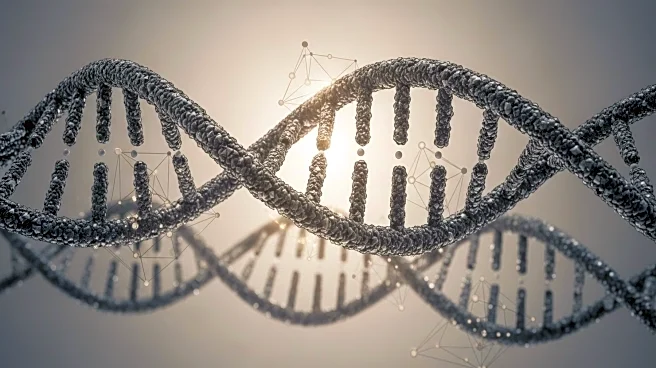What's Happening?
Researchers from the University of Pennsylvania's Perelman School of Medicine and the Children's Hospital of Philadelphia have introduced a new method for analyzing DNA methylation, a chemical modification that influences gene activity. The study, published in Nature, was led by Yanxiang Deng, PhD, and Wanding Zhou, PhD. The team developed a technology called Spatial-DMT, which allows for spatial joint profiling of DNA methylome and transcriptome at near single-cell resolution in mouse tissue samples. This advancement provides a detailed map of methylation biology and its interaction with gene expression, enhancing the capabilities of spatial multi-omics.
Why It's Important?
The development of Spatial-DMT represents a significant advancement in the field of genetic research, offering a more detailed understanding of DNA methylation and its role in gene expression. This tool could be instrumental in addressing complex biological questions, such as the mechanisms underlying Alzheimer's disease and cancer treatment responses. By providing a more comprehensive view of methylation patterns, researchers can better understand how these modifications affect cellular functions and disease progression, potentially leading to improved diagnostic and therapeutic strategies.
What's Next?
The introduction of Spatial-DMT may prompt further research into its applications across various biological fields. Researchers could explore its use in human tissue samples to gain insights into human diseases. Additionally, the tool's ability to map methylation and gene expression interactions might lead to new discoveries in personalized medicine, where treatments are tailored based on individual genetic profiles. As the technology is refined, it could become a standard tool in genomic research, influencing future studies and clinical practices.
Beyond the Headlines
The ethical implications of advanced genetic analysis tools like Spatial-DMT should be considered, particularly in terms of privacy and consent in genetic research. As the technology becomes more widespread, discussions around the responsible use of genetic data and potential impacts on genetic privacy will be crucial. Furthermore, the long-term cultural and societal shifts resulting from enhanced genetic understanding could influence public perceptions of genetic research and its applications.











